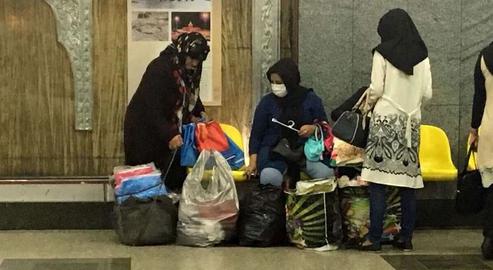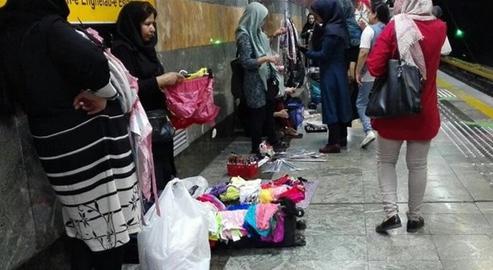With more and more Iranian households now in financial trouble, female peddlers have become a common sight on the Tehran metro. The informal nature of their work means they have no legal protection and must either deal with issues themselves or somehow learn to cope.
Sexual harassment is one of these women’s most frequent concerns. IranWire’s citizen journalist spoke to 12 such hawkers on the subway, whose accounts were almost uniformly depressing.
***
Despite all the disadvantages, there are at least some upsides to working as a female peddler on the Tehran metro. That is, that you can always seek refuge in the women’s carriage.
“The best thing about being here is that no-one is attacking you,” says Parisa, who sells scarves and previously worked as a waitress. “The restaurant I used to work in was very good for me, because I could bring free food back to my family.
“But one day my employer tried to approach me and touch my body. So I left the job and went to a shoe store, where I heard some language I won’t repeat. From there I went to a mantle shop, but I had to leave after my children were born.”
Several of her fellow hawkers agree: the women’s carriage is a sanctuary of sorts. “When you’re in a women’s carriage,” says Azadeh, who formerly cleaned houses, “you are relatively safe.”
Many female peddlers, however, can’t make a living from these metro cars alone and feel forced to venture out into the mixed carriages. They face all manner of harassment from station staff, male colleagues, and the passengers themselves, made worse by the fact that selling goods on the metro is not technically allowed.
Women often have to deal with their wares being seized on their daily rounds. In some instances, they say, station guards will ask for “friendship” or sex in return for letting them have the items back. “They’ll take the stuff and say, ‘You have to come at four o'clock in the morning to pick them up somewhere,'” another hawker, Alaleh, reports. “Well, obviously you just give up on these items, which you prepared with a lot of effort.”
"I was sitting at the station waiting for the train when the officer came,” recalls Shahla, another victim of sexual harassment by station staff. “He picked up my belongings and went upstairs. I followed him and he asked for my phone number.
“He said, 'Why are you working here? You’re beautiful, it’s a shame; I’ll find a job for you, this isn’t good for you.’ I said I liked this job and didn’t want to abandon it. No matter how much he insisted, I refused to accept; it was clear he wanted to abuse me. He got angry and said, 'Go, I won’t give you your stuff back.'"
One of their colleagues, Ameneh, had a near-identical story to tell. “He [the guard] told me to give him his number and become ‘friends’, and then he’d give me back my stuff. I regret doing it. Since then, whenever they take my goods, I don’t go after them.”
At the next stop, I board the train alongside a hawker named Roshanak, who says her male counterparts are also part of the problem. In the middle of trying to promote her goods to passengers, she suddenly falls silent and indicates another peddler nearby. “Some of them are so creepy. This one, for instance; when he comes by, I stop advertising my wares.”
"We can’t go into the men's carriage,” says another, Turan, “because if we go there, we won’t be safe. But they come to the women's carriage to sell their stuff and sometimes deliberately push us."
Some of those who have experience working in men's carriages have been harassed there. "I used to go in the men's carriage," says Shahin. "Although I worked there for several months, whenever I wanted to go, I was worried because of what I had heard. Many of them were not looking to buy anything but were looking for something else; it was really annoying."
Half of the carriages on the Tehran metro are reserved for women, with a clear glass partition between the two sets of cars. Men can see into the women’s side, which also makes some of the female peddlers nervous. They have adopted a wide variety of strategies to cope with harassment, chief among which is simply ignoring it.
"If they harass me, I don’t react," Mahnaz tells me. "Because it doesn't work. If I make a fuss, I lose my reputation. If some of them see it, the others will find out. Men side with each other at times like this."
Some of the female peddlers, however, involve themselves. "I was disturbed by a boy," Leila reports. "We argued and got into a fight. I punched him in the chest.
"The outfit I come here in is different to when I go out. I'm completely officious here. Outside I go out with makeup on and am quite stylish. But they still harass me. I tell them I have a husband, and to move along.”
Moved by these women’s stories of struggling alone against sexual harassment, I asked a female researcher based in Tehran, who has spent years studying women’s issues in the country, about why the burden is perceived to be on them to deal with it.
"The absence of laws to protect women has led women to take action to protect themselves," she told me. “As you mention, many women who have been harassed in their previous jobs are seeking refuge on the metro carriages; they seek a safe environment in which to do their job.
“But they are also harassed here. This shows that gender segregation not only does not prevent women from being harassed, but it also reduces their economic opportunities.
"Increasing public awareness about abuse will allow women to push for better security in all the carriages. But these women don’t have a voice in the media with which to address their plight, and due to the fact that peddling is not legal on the metro, many avoid going to the police.”
“Because activity in civil society now comes at a worse cost than ever before, civil society has become so weak that it is unable to deal with the problems of various social groups, including female peddlers."
This article was written by a citizen journalist in Tehran under a pseudonym.
Related coverage:
Tehran’s Female Drivers Face Harassment and Abuse
Blame the Woman: Sexual Harassment in Iran
Dispatch from a Women’s Only Park: All We Want is Sunshine on Our Hair
visit the accountability section
In this section of Iran Wire, you can contact the officials and launch your campaign for various problems



























comments